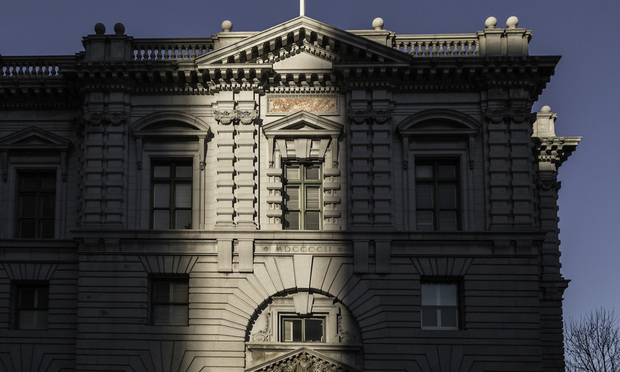9th Circuit Orders Fresh Look at Alleged Government Misconduct in 'No Fly List' Case
The U.S. Court of Appeals for the Ninth Circuit, sitting en banc, lambasted the government's conduct in the case of Dr. Rahinah Ibrahim, a Malaysian national and now-Stanford University doctorate, who was wrongly placed on a “no fly” list in 2004.
January 02, 2019 at 05:24 PM
4 minute read
 U.S. Court of Appeal for the Ninth Circuit.
U.S. Court of Appeal for the Ninth Circuit.
A federal appeals court ordered a California trial judge Wednesday to review whether the U.S. government acted in bad faith in a case involving a Muslim woman's erroneous placement on a “no fly” list.
The U.S. Court of Appeals for the Ninth Circuit, sitting en banc, lambasted the government's conduct in the case of Dr. Rahinah Ibrahim, a Malaysian national and now-Stanford University doctorate, who was wrongly placed on a “no fly” list in 2004. That move—and her 2005 detention in a San Francisco airport—spurred a yearslong legal fight between Ibrahim's civil rights lawyers at San Jose firm McManis Faulkner and the government.
Agencies named in the lawsuit included the Department of Homeland Security, the National Counterterrorism Center, and the State Department.
The panel's majority, in an opinion written by Judge Kim McLane Wardlaw, said the U.S., during that legal fight, “played discovery games, made false representations to the court, misused the court's time, and interfered with the public's right of access to trial.” The panel directed U.S. District Judge William Alsup in San Francisco to recalculate attorney fees he earlier awarded the firm. It also said Alsup's determination that the government had not acted in bad faith “was in error because it was incomplete.”
“Dr. Ibrahim should not have had to endure over a decade of contentious litigation, two trips to the court of appeals, extensive discovery, over 800 docket entries amounting to many thousands of pages of record, and a weeklong trial the government precluded her (and her U.S.-citizen daughter) from attending, only to come full circle to the government's concession that she never belonged on the No Fly list at all—that she is not and never was a terrorist or threat to airline passenger or civil aviation security,” Wednesday's opinion said.
“It should not have taken a court order to require the government to 'cleans[e] and/or correct[] … the mistaken 2004 derogatory designation' of Dr. Ibrahim, which had spread like an insidious virus through numerous government watchlists,” Wardlaw wrote.
The majority took specific aim at the government's “stubborn refusal” to turn over discovery despite a court order, and said the government “continued to drag its feet” on producing privilege information that Ibrahim's attorneys were cleared to review. Wardlaw said the government also refused to initially comply with a court order to disclose Ibrahim's current watch list status.
Judge Consuelo Callahan, joined by Judges N. Randy Smith and Jacqueline Nguyen, concurred in part and dissented in part from the panel's opinion, arguing the en banc panel should have affirmed the district court's limits to Ibrahim's attorney fees.
Callahan said the majority overstepped its role as an appeals court by finding that the government's position was not substantially justified. Callahan also said Ibrahim failed to show clear error in the district court's finding that the government had not acted in bad faith.
Jim McManis, a name partner at McManis Faulkner, said he was thrilled by the panel's ruling.
“We've had this case for over 10 years, had a lot of good lawyers working hard, and I'm just very pleased, after all these years fighting the federal government, the court has recognized the good work these folks did and agrees we should be properly compensated,” he said.
The Justice Department declined to comment.
Read more:
Federal Workers Sue Over Pay Denied During Ongoing Shutdown
Judge Rules State AGs ACA Lawsuit May Proceed Despite Government Shutdown
Texas Judge Stays His ACA Ruling, but Adds an Appeal Is Unlikely to Succeed
This content has been archived. It is available through our partners, LexisNexis® and Bloomberg Law.
To view this content, please continue to their sites.
Not a Lexis Subscriber?
Subscribe Now
Not a Bloomberg Law Subscriber?
Subscribe Now
NOT FOR REPRINT
© 2025 ALM Global, LLC, All Rights Reserved. Request academic re-use from www.copyright.com. All other uses, submit a request to [email protected]. For more information visit Asset & Logo Licensing.
You Might Like
View All
Morgan Lewis Shutters Shenzhen Office Less Than Two Years After Launch

Texas-Based Ferguson Braswell Expands in California With 6-Lawyer Team From Orange County Law Firm
2 minute read

Justin Baldoni Sues Blake Lively and Ryan Reynolds for $400M in New Step in 'It Ends With Us' Fight
6 minute readTrending Stories
- 1'A Death Sentence for TikTok'?: Litigators and Experts Weigh Impact of Potential Ban on Creators and Data Privacy
- 2Bribery Case Against Former Lt. Gov. Brian Benjamin Is Dropped
- 3‘Extremely Disturbing’: AI Firms Face Class Action by ‘Taskers’ Exposed to Traumatic Content
- 4State Appeals Court Revives BraunHagey Lawsuit Alleging $4.2M Unlawful Wire to China
- 5Invoking Trump, AG Bonta Reminds Lawyers of Duties to Noncitizens in Plea Dealing
Who Got The Work
J. Brugh Lower of Gibbons has entered an appearance for industrial equipment supplier Devco Corporation in a pending trademark infringement lawsuit. The suit, accusing the defendant of selling knock-off Graco products, was filed Dec. 18 in New Jersey District Court by Rivkin Radler on behalf of Graco Inc. and Graco Minnesota. The case, assigned to U.S. District Judge Zahid N. Quraishi, is 3:24-cv-11294, Graco Inc. et al v. Devco Corporation.
Who Got The Work
Rebecca Maller-Stein and Kent A. Yalowitz of Arnold & Porter Kaye Scholer have entered their appearances for Hanaco Venture Capital and its executives, Lior Prosor and David Frankel, in a pending securities lawsuit. The action, filed on Dec. 24 in New York Southern District Court by Zell, Aron & Co. on behalf of Goldeneye Advisors, accuses the defendants of negligently and fraudulently managing the plaintiff's $1 million investment. The case, assigned to U.S. District Judge Vernon S. Broderick, is 1:24-cv-09918, Goldeneye Advisors, LLC v. Hanaco Venture Capital, Ltd. et al.
Who Got The Work
Attorneys from A&O Shearman has stepped in as defense counsel for Toronto-Dominion Bank and other defendants in a pending securities class action. The suit, filed Dec. 11 in New York Southern District Court by Bleichmar Fonti & Auld, accuses the defendants of concealing the bank's 'pervasive' deficiencies in regards to its compliance with the Bank Secrecy Act and the quality of its anti-money laundering controls. The case, assigned to U.S. District Judge Arun Subramanian, is 1:24-cv-09445, Gonzalez v. The Toronto-Dominion Bank et al.
Who Got The Work
Crown Castle International, a Pennsylvania company providing shared communications infrastructure, has turned to Luke D. Wolf of Gordon Rees Scully Mansukhani to fend off a pending breach-of-contract lawsuit. The court action, filed Nov. 25 in Michigan Eastern District Court by Hooper Hathaway PC on behalf of The Town Residences LLC, accuses Crown Castle of failing to transfer approximately $30,000 in utility payments from T-Mobile in breach of a roof-top lease and assignment agreement. The case, assigned to U.S. District Judge Susan K. Declercq, is 2:24-cv-13131, The Town Residences LLC v. T-Mobile US, Inc. et al.
Who Got The Work
Wilfred P. Coronato and Daniel M. Schwartz of McCarter & English have stepped in as defense counsel to Electrolux Home Products Inc. in a pending product liability lawsuit. The court action, filed Nov. 26 in New York Eastern District Court by Poulos Lopiccolo PC and Nagel Rice LLP on behalf of David Stern, alleges that the defendant's refrigerators’ drawers and shelving repeatedly break and fall apart within months after purchase. The case, assigned to U.S. District Judge Joan M. Azrack, is 2:24-cv-08204, Stern v. Electrolux Home Products, Inc.
Featured Firms
Law Offices of Gary Martin Hays & Associates, P.C.
(470) 294-1674
Law Offices of Mark E. Salomone
(857) 444-6468
Smith & Hassler
(713) 739-1250






